An Analysis of Globalization's Impact on Inter-Country Relationships
VerifiedAdded on 2021/06/14
|11
|3042
|195
Essay
AI Summary
This essay examines the multifaceted impact of globalization on the relationships between countries, exploring economic, cultural, social, and political dimensions. It discusses how globalization influences trade, cultural exchange, and political interactions, including the role of free trade agreements and global value chains. The essay highlights both the benefits, such as increased access to products and economic growth, and the challenges, like job losses and cultural homogenization. It also analyzes the impact of political globalization and international organizations like the United Nations. The paper concludes by discussing the internationalization of crimes and the impact on religion, offering recommendations for managing these challenges and fostering positive global relationships.
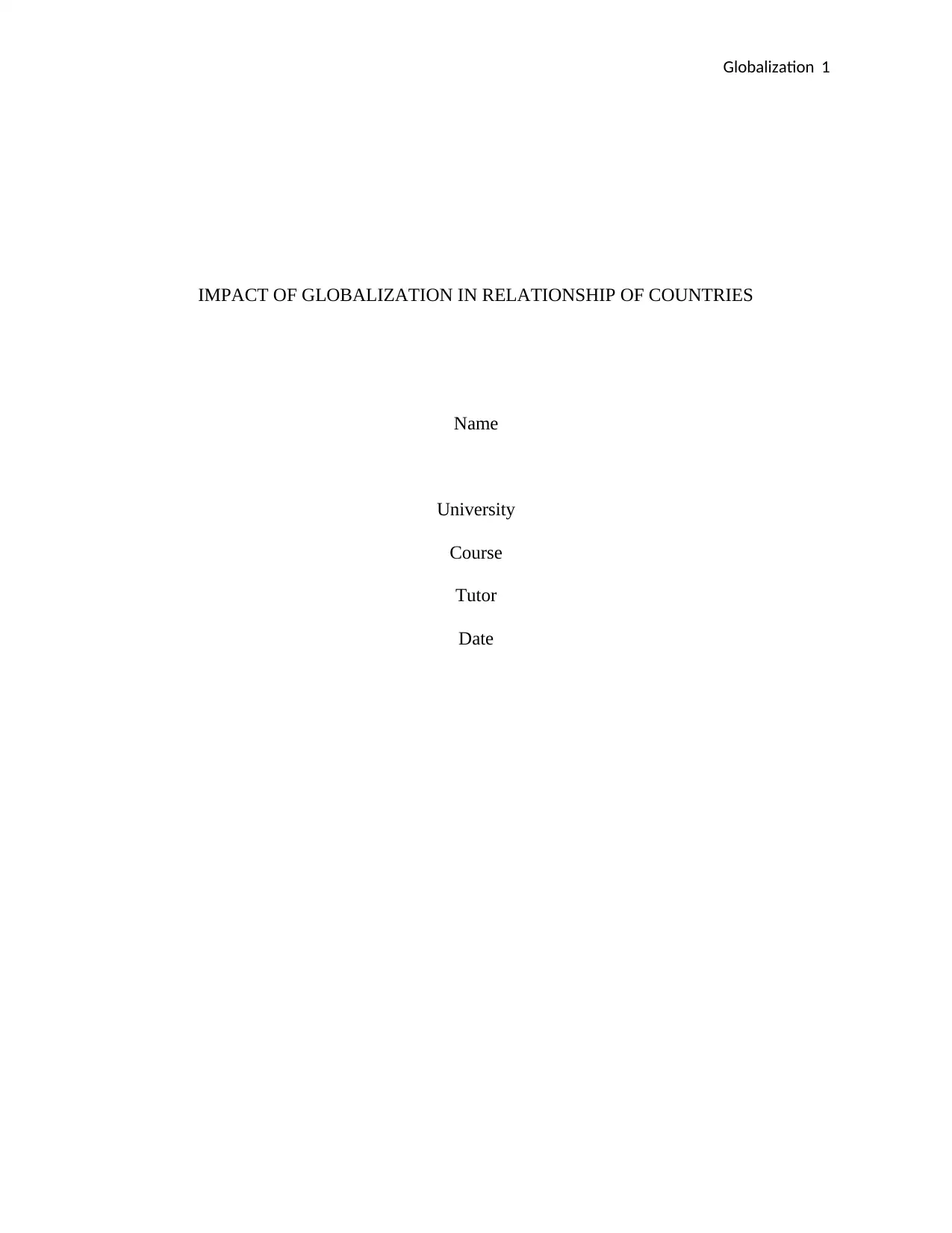
Globalization 1
IMPACT OF GLOBALIZATION IN RELATIONSHIP OF COUNTRIES
Name
University
Course
Tutor
Date
IMPACT OF GLOBALIZATION IN RELATIONSHIP OF COUNTRIES
Name
University
Course
Tutor
Date
Paraphrase This Document
Need a fresh take? Get an instant paraphrase of this document with our AI Paraphraser
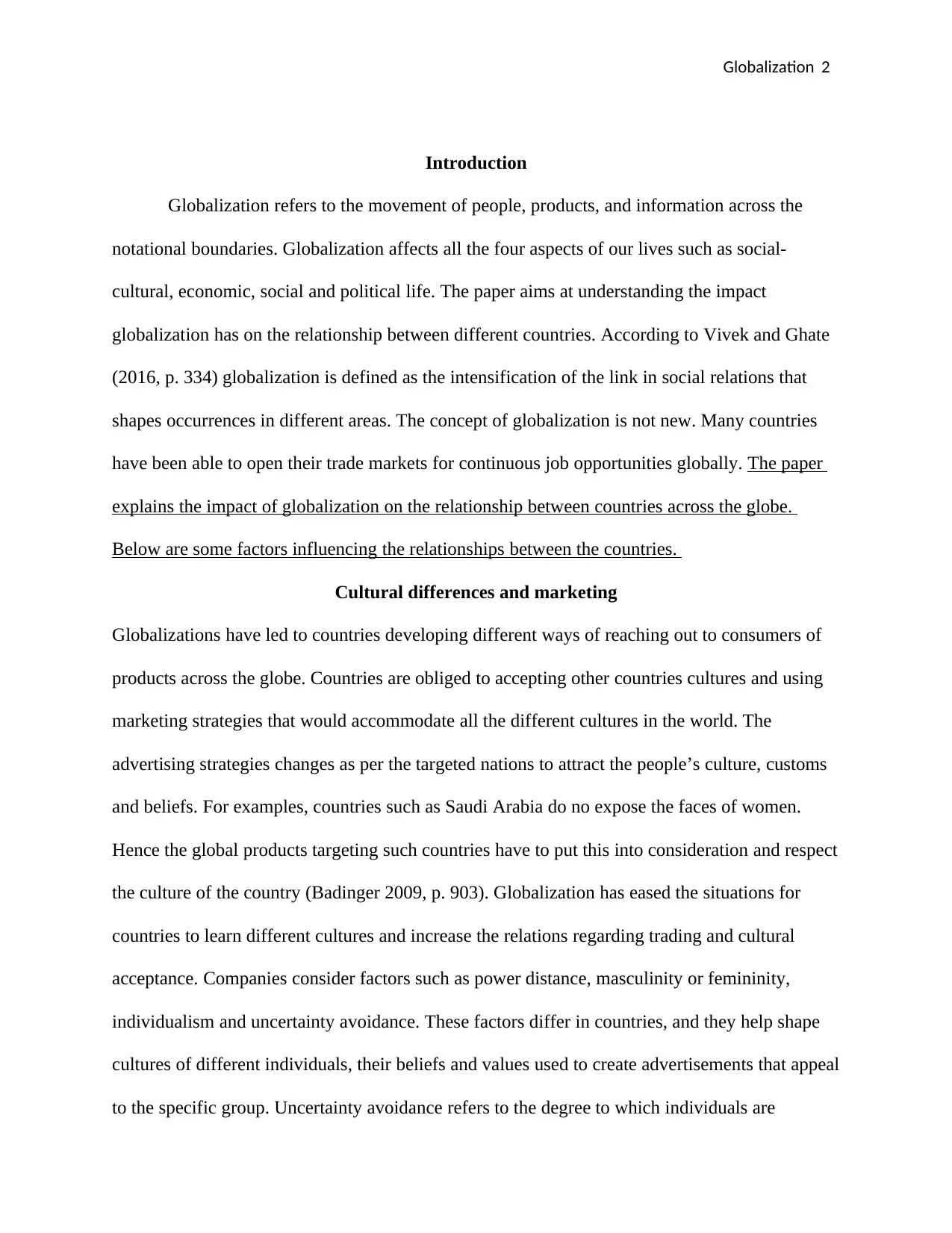
Globalization 2
Introduction
Globalization refers to the movement of people, products, and information across the
notational boundaries. Globalization affects all the four aspects of our lives such as social-
cultural, economic, social and political life. The paper aims at understanding the impact
globalization has on the relationship between different countries. According to Vivek and Ghate
(2016, p. 334) globalization is defined as the intensification of the link in social relations that
shapes occurrences in different areas. The concept of globalization is not new. Many countries
have been able to open their trade markets for continuous job opportunities globally. The paper
explains the impact of globalization on the relationship between countries across the globe.
Below are some factors influencing the relationships between the countries.
Cultural differences and marketing
Globalizations have led to countries developing different ways of reaching out to consumers of
products across the globe. Countries are obliged to accepting other countries cultures and using
marketing strategies that would accommodate all the different cultures in the world. The
advertising strategies changes as per the targeted nations to attract the people’s culture, customs
and beliefs. For examples, countries such as Saudi Arabia do no expose the faces of women.
Hence the global products targeting such countries have to put this into consideration and respect
the culture of the country (Badinger 2009, p. 903). Globalization has eased the situations for
countries to learn different cultures and increase the relations regarding trading and cultural
acceptance. Companies consider factors such as power distance, masculinity or femininity,
individualism and uncertainty avoidance. These factors differ in countries, and they help shape
cultures of different individuals, their beliefs and values used to create advertisements that appeal
to the specific group. Uncertainty avoidance refers to the degree to which individuals are
Introduction
Globalization refers to the movement of people, products, and information across the
notational boundaries. Globalization affects all the four aspects of our lives such as social-
cultural, economic, social and political life. The paper aims at understanding the impact
globalization has on the relationship between different countries. According to Vivek and Ghate
(2016, p. 334) globalization is defined as the intensification of the link in social relations that
shapes occurrences in different areas. The concept of globalization is not new. Many countries
have been able to open their trade markets for continuous job opportunities globally. The paper
explains the impact of globalization on the relationship between countries across the globe.
Below are some factors influencing the relationships between the countries.
Cultural differences and marketing
Globalizations have led to countries developing different ways of reaching out to consumers of
products across the globe. Countries are obliged to accepting other countries cultures and using
marketing strategies that would accommodate all the different cultures in the world. The
advertising strategies changes as per the targeted nations to attract the people’s culture, customs
and beliefs. For examples, countries such as Saudi Arabia do no expose the faces of women.
Hence the global products targeting such countries have to put this into consideration and respect
the culture of the country (Badinger 2009, p. 903). Globalization has eased the situations for
countries to learn different cultures and increase the relations regarding trading and cultural
acceptance. Companies consider factors such as power distance, masculinity or femininity,
individualism and uncertainty avoidance. These factors differ in countries, and they help shape
cultures of different individuals, their beliefs and values used to create advertisements that appeal
to the specific group. Uncertainty avoidance refers to the degree to which individuals are
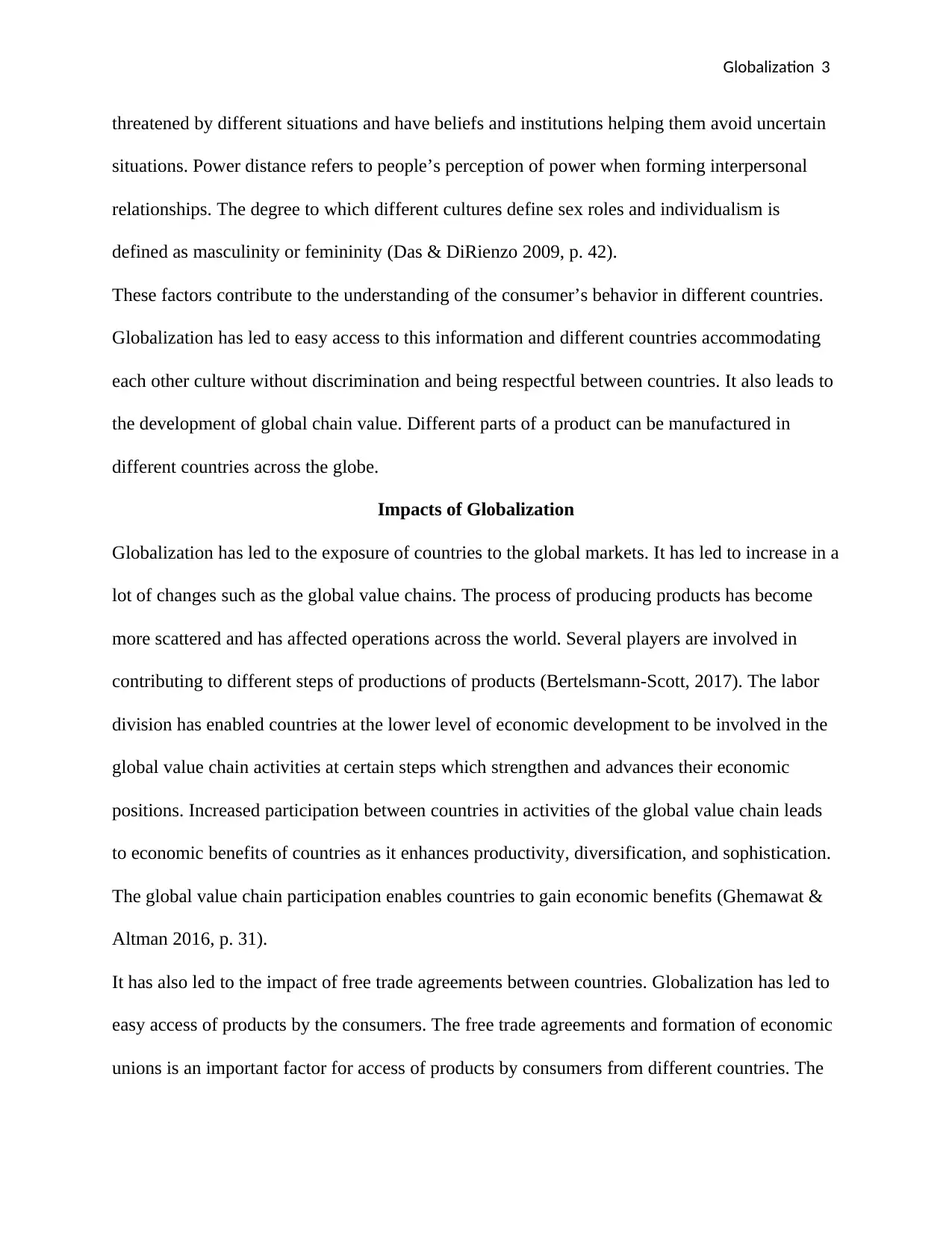
Globalization 3
threatened by different situations and have beliefs and institutions helping them avoid uncertain
situations. Power distance refers to people’s perception of power when forming interpersonal
relationships. The degree to which different cultures define sex roles and individualism is
defined as masculinity or femininity (Das & DiRienzo 2009, p. 42).
These factors contribute to the understanding of the consumer’s behavior in different countries.
Globalization has led to easy access to this information and different countries accommodating
each other culture without discrimination and being respectful between countries. It also leads to
the development of global chain value. Different parts of a product can be manufactured in
different countries across the globe.
Impacts of Globalization
Globalization has led to the exposure of countries to the global markets. It has led to increase in a
lot of changes such as the global value chains. The process of producing products has become
more scattered and has affected operations across the world. Several players are involved in
contributing to different steps of productions of products (Bertelsmann-Scott, 2017). The labor
division has enabled countries at the lower level of economic development to be involved in the
global value chain activities at certain steps which strengthen and advances their economic
positions. Increased participation between countries in activities of the global value chain leads
to economic benefits of countries as it enhances productivity, diversification, and sophistication.
The global value chain participation enables countries to gain economic benefits (Ghemawat &
Altman 2016, p. 31).
It has also led to the impact of free trade agreements between countries. Globalization has led to
easy access of products by the consumers. The free trade agreements and formation of economic
unions is an important factor for access of products by consumers from different countries. The
threatened by different situations and have beliefs and institutions helping them avoid uncertain
situations. Power distance refers to people’s perception of power when forming interpersonal
relationships. The degree to which different cultures define sex roles and individualism is
defined as masculinity or femininity (Das & DiRienzo 2009, p. 42).
These factors contribute to the understanding of the consumer’s behavior in different countries.
Globalization has led to easy access to this information and different countries accommodating
each other culture without discrimination and being respectful between countries. It also leads to
the development of global chain value. Different parts of a product can be manufactured in
different countries across the globe.
Impacts of Globalization
Globalization has led to the exposure of countries to the global markets. It has led to increase in a
lot of changes such as the global value chains. The process of producing products has become
more scattered and has affected operations across the world. Several players are involved in
contributing to different steps of productions of products (Bertelsmann-Scott, 2017). The labor
division has enabled countries at the lower level of economic development to be involved in the
global value chain activities at certain steps which strengthen and advances their economic
positions. Increased participation between countries in activities of the global value chain leads
to economic benefits of countries as it enhances productivity, diversification, and sophistication.
The global value chain participation enables countries to gain economic benefits (Ghemawat &
Altman 2016, p. 31).
It has also led to the impact of free trade agreements between countries. Globalization has led to
easy access of products by the consumers. The free trade agreements and formation of economic
unions is an important factor for access of products by consumers from different countries. The
⊘ This is a preview!⊘
Do you want full access?
Subscribe today to unlock all pages.

Trusted by 1+ million students worldwide
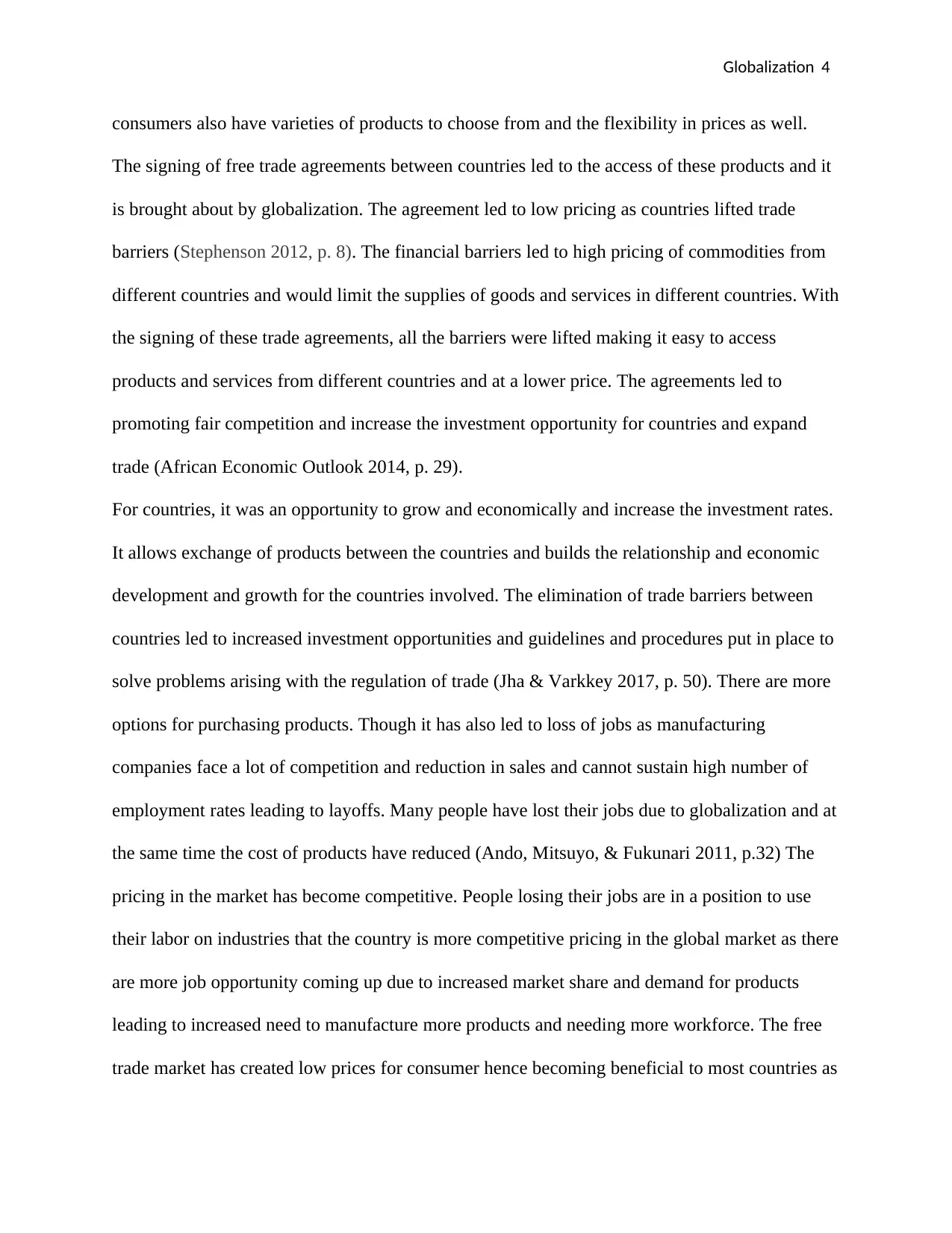
Globalization 4
consumers also have varieties of products to choose from and the flexibility in prices as well.
The signing of free trade agreements between countries led to the access of these products and it
is brought about by globalization. The agreement led to low pricing as countries lifted trade
barriers (Stephenson 2012, p. 8). The financial barriers led to high pricing of commodities from
different countries and would limit the supplies of goods and services in different countries. With
the signing of these trade agreements, all the barriers were lifted making it easy to access
products and services from different countries and at a lower price. The agreements led to
promoting fair competition and increase the investment opportunity for countries and expand
trade (African Economic Outlook 2014, p. 29).
For countries, it was an opportunity to grow and economically and increase the investment rates.
It allows exchange of products between the countries and builds the relationship and economic
development and growth for the countries involved. The elimination of trade barriers between
countries led to increased investment opportunities and guidelines and procedures put in place to
solve problems arising with the regulation of trade (Jha & Varkkey 2017, p. 50). There are more
options for purchasing products. Though it has also led to loss of jobs as manufacturing
companies face a lot of competition and reduction in sales and cannot sustain high number of
employment rates leading to layoffs. Many people have lost their jobs due to globalization and at
the same time the cost of products have reduced (Ando, Mitsuyo, & Fukunari 2011, p.32) The
pricing in the market has become competitive. People losing their jobs are in a position to use
their labor on industries that the country is more competitive pricing in the global market as there
are more job opportunity coming up due to increased market share and demand for products
leading to increased need to manufacture more products and needing more workforce. The free
trade market has created low prices for consumer hence becoming beneficial to most countries as
consumers also have varieties of products to choose from and the flexibility in prices as well.
The signing of free trade agreements between countries led to the access of these products and it
is brought about by globalization. The agreement led to low pricing as countries lifted trade
barriers (Stephenson 2012, p. 8). The financial barriers led to high pricing of commodities from
different countries and would limit the supplies of goods and services in different countries. With
the signing of these trade agreements, all the barriers were lifted making it easy to access
products and services from different countries and at a lower price. The agreements led to
promoting fair competition and increase the investment opportunity for countries and expand
trade (African Economic Outlook 2014, p. 29).
For countries, it was an opportunity to grow and economically and increase the investment rates.
It allows exchange of products between the countries and builds the relationship and economic
development and growth for the countries involved. The elimination of trade barriers between
countries led to increased investment opportunities and guidelines and procedures put in place to
solve problems arising with the regulation of trade (Jha & Varkkey 2017, p. 50). There are more
options for purchasing products. Though it has also led to loss of jobs as manufacturing
companies face a lot of competition and reduction in sales and cannot sustain high number of
employment rates leading to layoffs. Many people have lost their jobs due to globalization and at
the same time the cost of products have reduced (Ando, Mitsuyo, & Fukunari 2011, p.32) The
pricing in the market has become competitive. People losing their jobs are in a position to use
their labor on industries that the country is more competitive pricing in the global market as there
are more job opportunity coming up due to increased market share and demand for products
leading to increased need to manufacture more products and needing more workforce. The free
trade market has created low prices for consumer hence becoming beneficial to most countries as
Paraphrase This Document
Need a fresh take? Get an instant paraphrase of this document with our AI Paraphraser
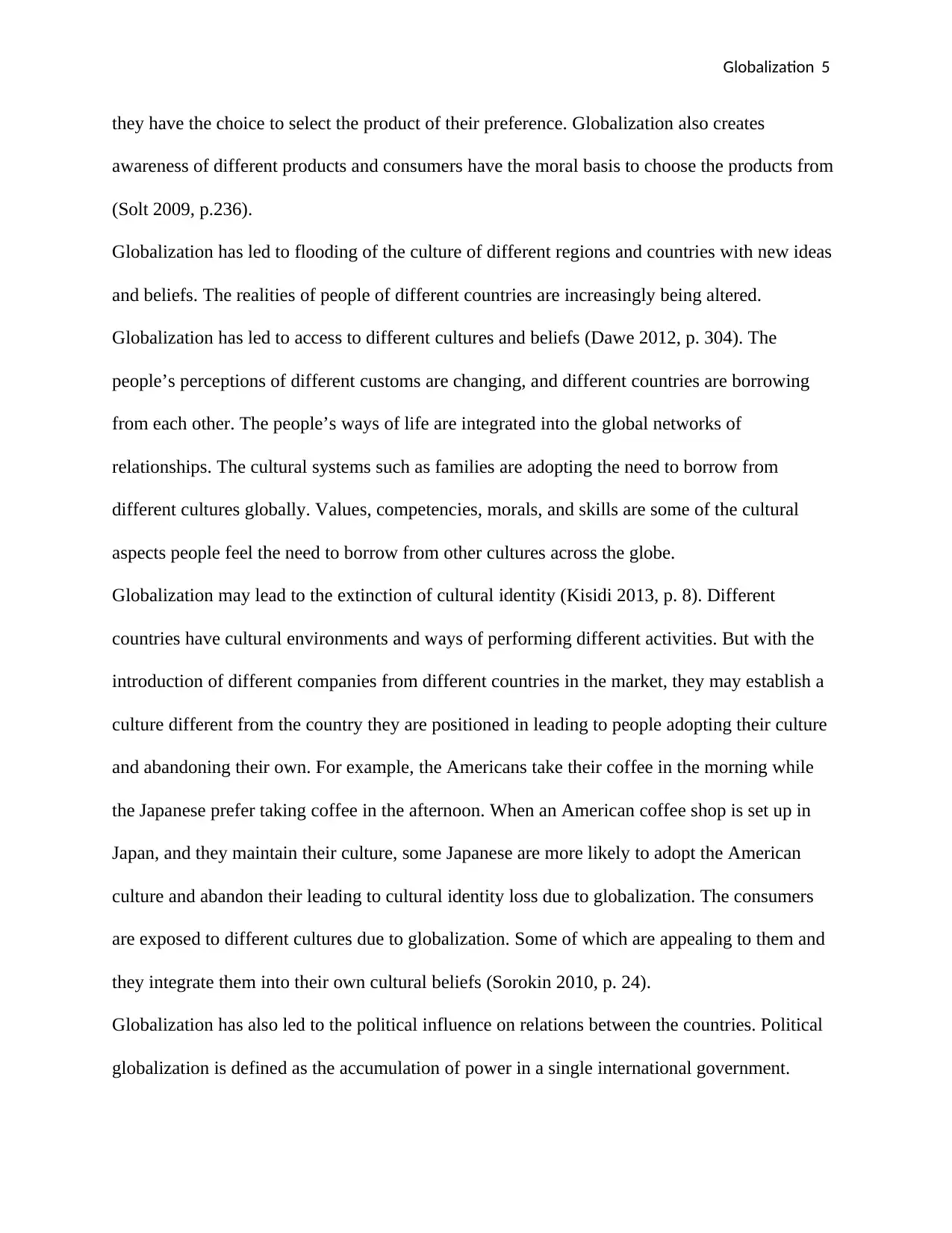
Globalization 5
they have the choice to select the product of their preference. Globalization also creates
awareness of different products and consumers have the moral basis to choose the products from
(Solt 2009, p.236).
Globalization has led to flooding of the culture of different regions and countries with new ideas
and beliefs. The realities of people of different countries are increasingly being altered.
Globalization has led to access to different cultures and beliefs (Dawe 2012, p. 304). The
people’s perceptions of different customs are changing, and different countries are borrowing
from each other. The people’s ways of life are integrated into the global networks of
relationships. The cultural systems such as families are adopting the need to borrow from
different cultures globally. Values, competencies, morals, and skills are some of the cultural
aspects people feel the need to borrow from other cultures across the globe.
Globalization may lead to the extinction of cultural identity (Kisidi 2013, p. 8). Different
countries have cultural environments and ways of performing different activities. But with the
introduction of different companies from different countries in the market, they may establish a
culture different from the country they are positioned in leading to people adopting their culture
and abandoning their own. For example, the Americans take their coffee in the morning while
the Japanese prefer taking coffee in the afternoon. When an American coffee shop is set up in
Japan, and they maintain their culture, some Japanese are more likely to adopt the American
culture and abandon their leading to cultural identity loss due to globalization. The consumers
are exposed to different cultures due to globalization. Some of which are appealing to them and
they integrate them into their own cultural beliefs (Sorokin 2010, p. 24).
Globalization has also led to the political influence on relations between the countries. Political
globalization is defined as the accumulation of power in a single international government.
they have the choice to select the product of their preference. Globalization also creates
awareness of different products and consumers have the moral basis to choose the products from
(Solt 2009, p.236).
Globalization has led to flooding of the culture of different regions and countries with new ideas
and beliefs. The realities of people of different countries are increasingly being altered.
Globalization has led to access to different cultures and beliefs (Dawe 2012, p. 304). The
people’s perceptions of different customs are changing, and different countries are borrowing
from each other. The people’s ways of life are integrated into the global networks of
relationships. The cultural systems such as families are adopting the need to borrow from
different cultures globally. Values, competencies, morals, and skills are some of the cultural
aspects people feel the need to borrow from other cultures across the globe.
Globalization may lead to the extinction of cultural identity (Kisidi 2013, p. 8). Different
countries have cultural environments and ways of performing different activities. But with the
introduction of different companies from different countries in the market, they may establish a
culture different from the country they are positioned in leading to people adopting their culture
and abandoning their own. For example, the Americans take their coffee in the morning while
the Japanese prefer taking coffee in the afternoon. When an American coffee shop is set up in
Japan, and they maintain their culture, some Japanese are more likely to adopt the American
culture and abandon their leading to cultural identity loss due to globalization. The consumers
are exposed to different cultures due to globalization. Some of which are appealing to them and
they integrate them into their own cultural beliefs (Sorokin 2010, p. 24).
Globalization has also led to the political influence on relations between the countries. Political
globalization is defined as the accumulation of power in a single international government.
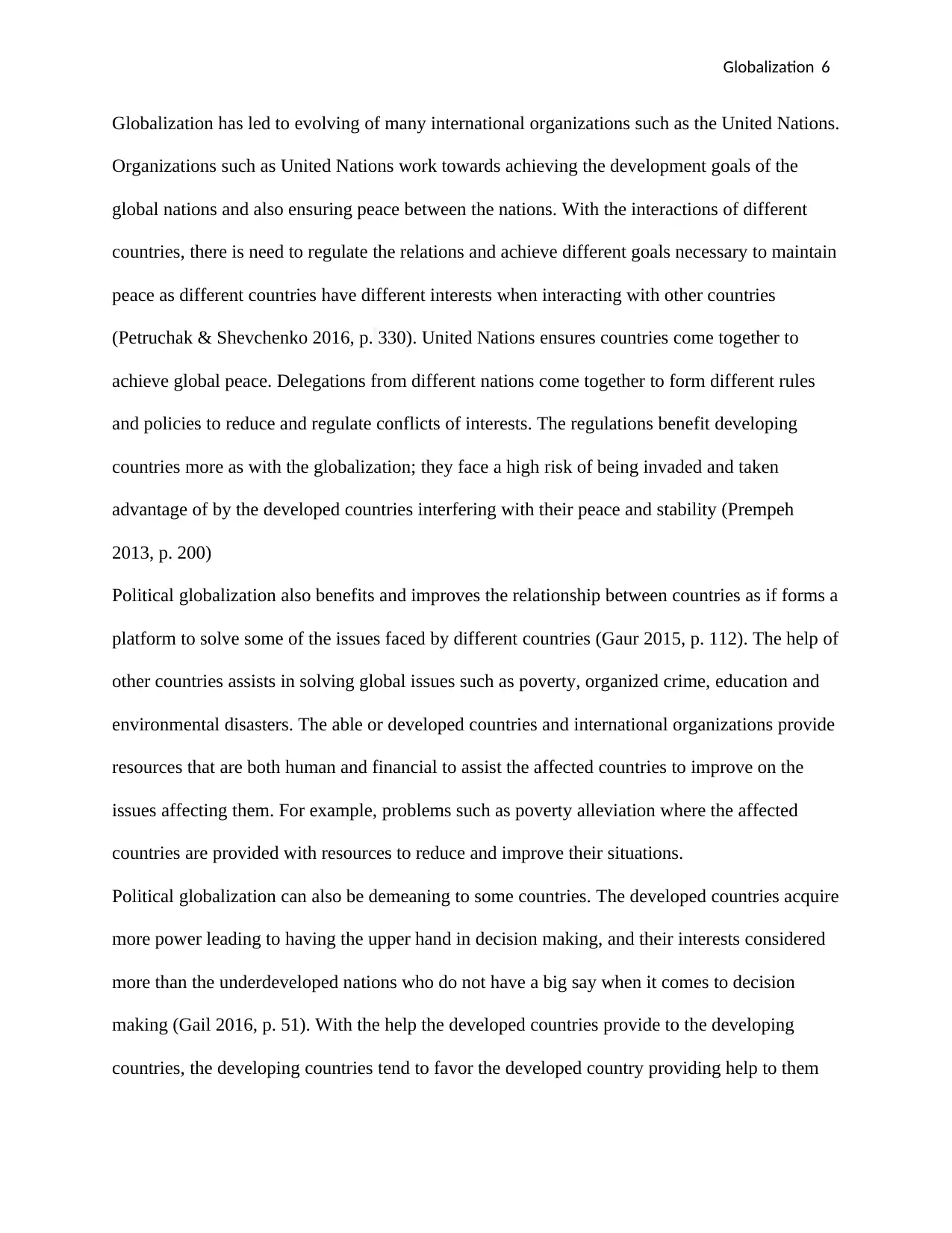
Globalization 6
Globalization has led to evolving of many international organizations such as the United Nations.
Organizations such as United Nations work towards achieving the development goals of the
global nations and also ensuring peace between the nations. With the interactions of different
countries, there is need to regulate the relations and achieve different goals necessary to maintain
peace as different countries have different interests when interacting with other countries
(Petruchak & Shevchenko 2016, p. 330). United Nations ensures countries come together to
achieve global peace. Delegations from different nations come together to form different rules
and policies to reduce and regulate conflicts of interests. The regulations benefit developing
countries more as with the globalization; they face a high risk of being invaded and taken
advantage of by the developed countries interfering with their peace and stability (Prempeh
2013, p. 200)
Political globalization also benefits and improves the relationship between countries as if forms a
platform to solve some of the issues faced by different countries (Gaur 2015, p. 112). The help of
other countries assists in solving global issues such as poverty, organized crime, education and
environmental disasters. The able or developed countries and international organizations provide
resources that are both human and financial to assist the affected countries to improve on the
issues affecting them. For example, problems such as poverty alleviation where the affected
countries are provided with resources to reduce and improve their situations.
Political globalization can also be demeaning to some countries. The developed countries acquire
more power leading to having the upper hand in decision making, and their interests considered
more than the underdeveloped nations who do not have a big say when it comes to decision
making (Gail 2016, p. 51). With the help the developed countries provide to the developing
countries, the developing countries tend to favor the developed country providing help to them
Globalization has led to evolving of many international organizations such as the United Nations.
Organizations such as United Nations work towards achieving the development goals of the
global nations and also ensuring peace between the nations. With the interactions of different
countries, there is need to regulate the relations and achieve different goals necessary to maintain
peace as different countries have different interests when interacting with other countries
(Petruchak & Shevchenko 2016, p. 330). United Nations ensures countries come together to
achieve global peace. Delegations from different nations come together to form different rules
and policies to reduce and regulate conflicts of interests. The regulations benefit developing
countries more as with the globalization; they face a high risk of being invaded and taken
advantage of by the developed countries interfering with their peace and stability (Prempeh
2013, p. 200)
Political globalization also benefits and improves the relationship between countries as if forms a
platform to solve some of the issues faced by different countries (Gaur 2015, p. 112). The help of
other countries assists in solving global issues such as poverty, organized crime, education and
environmental disasters. The able or developed countries and international organizations provide
resources that are both human and financial to assist the affected countries to improve on the
issues affecting them. For example, problems such as poverty alleviation where the affected
countries are provided with resources to reduce and improve their situations.
Political globalization can also be demeaning to some countries. The developed countries acquire
more power leading to having the upper hand in decision making, and their interests considered
more than the underdeveloped nations who do not have a big say when it comes to decision
making (Gail 2016, p. 51). With the help the developed countries provide to the developing
countries, the developing countries tend to favor the developed country providing help to them
⊘ This is a preview!⊘
Do you want full access?
Subscribe today to unlock all pages.

Trusted by 1+ million students worldwide
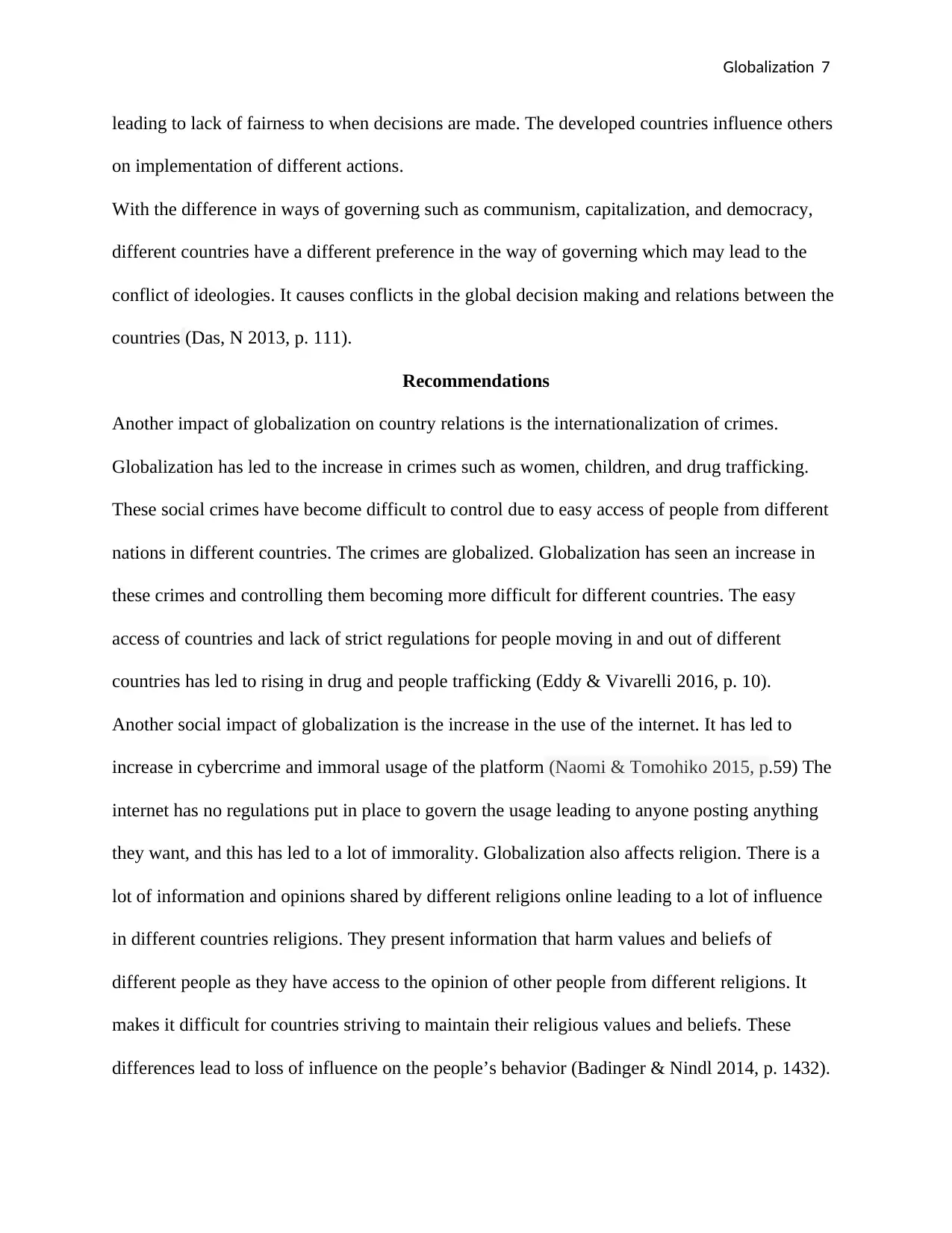
Globalization 7
leading to lack of fairness to when decisions are made. The developed countries influence others
on implementation of different actions.
With the difference in ways of governing such as communism, capitalization, and democracy,
different countries have a different preference in the way of governing which may lead to the
conflict of ideologies. It causes conflicts in the global decision making and relations between the
countries (Das, N 2013, p. 111).
Recommendations
Another impact of globalization on country relations is the internationalization of crimes.
Globalization has led to the increase in crimes such as women, children, and drug trafficking.
These social crimes have become difficult to control due to easy access of people from different
nations in different countries. The crimes are globalized. Globalization has seen an increase in
these crimes and controlling them becoming more difficult for different countries. The easy
access of countries and lack of strict regulations for people moving in and out of different
countries has led to rising in drug and people trafficking (Eddy & Vivarelli 2016, p. 10).
Another social impact of globalization is the increase in the use of the internet. It has led to
increase in cybercrime and immoral usage of the platform (Naomi & Tomohiko 2015, p.59) The
internet has no regulations put in place to govern the usage leading to anyone posting anything
they want, and this has led to a lot of immorality. Globalization also affects religion. There is a
lot of information and opinions shared by different religions online leading to a lot of influence
in different countries religions. They present information that harm values and beliefs of
different people as they have access to the opinion of other people from different religions. It
makes it difficult for countries striving to maintain their religious values and beliefs. These
differences lead to loss of influence on the people’s behavior (Badinger & Nindl 2014, p. 1432).
leading to lack of fairness to when decisions are made. The developed countries influence others
on implementation of different actions.
With the difference in ways of governing such as communism, capitalization, and democracy,
different countries have a different preference in the way of governing which may lead to the
conflict of ideologies. It causes conflicts in the global decision making and relations between the
countries (Das, N 2013, p. 111).
Recommendations
Another impact of globalization on country relations is the internationalization of crimes.
Globalization has led to the increase in crimes such as women, children, and drug trafficking.
These social crimes have become difficult to control due to easy access of people from different
nations in different countries. The crimes are globalized. Globalization has seen an increase in
these crimes and controlling them becoming more difficult for different countries. The easy
access of countries and lack of strict regulations for people moving in and out of different
countries has led to rising in drug and people trafficking (Eddy & Vivarelli 2016, p. 10).
Another social impact of globalization is the increase in the use of the internet. It has led to
increase in cybercrime and immoral usage of the platform (Naomi & Tomohiko 2015, p.59) The
internet has no regulations put in place to govern the usage leading to anyone posting anything
they want, and this has led to a lot of immorality. Globalization also affects religion. There is a
lot of information and opinions shared by different religions online leading to a lot of influence
in different countries religions. They present information that harm values and beliefs of
different people as they have access to the opinion of other people from different religions. It
makes it difficult for countries striving to maintain their religious values and beliefs. These
differences lead to loss of influence on the people’s behavior (Badinger & Nindl 2014, p. 1432).
Paraphrase This Document
Need a fresh take? Get an instant paraphrase of this document with our AI Paraphraser
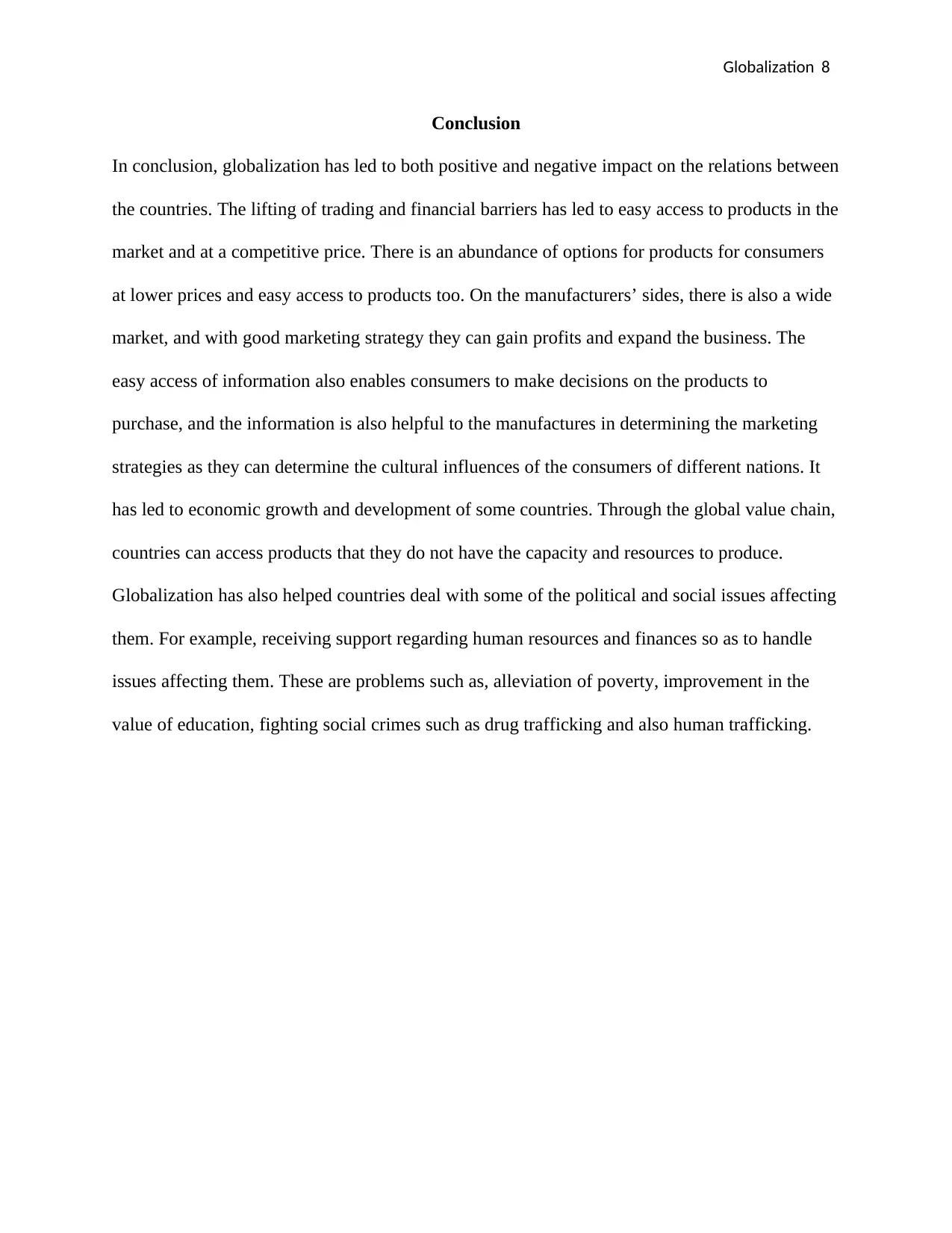
Globalization 8
Conclusion
In conclusion, globalization has led to both positive and negative impact on the relations between
the countries. The lifting of trading and financial barriers has led to easy access to products in the
market and at a competitive price. There is an abundance of options for products for consumers
at lower prices and easy access to products too. On the manufacturers’ sides, there is also a wide
market, and with good marketing strategy they can gain profits and expand the business. The
easy access of information also enables consumers to make decisions on the products to
purchase, and the information is also helpful to the manufactures in determining the marketing
strategies as they can determine the cultural influences of the consumers of different nations. It
has led to economic growth and development of some countries. Through the global value chain,
countries can access products that they do not have the capacity and resources to produce.
Globalization has also helped countries deal with some of the political and social issues affecting
them. For example, receiving support regarding human resources and finances so as to handle
issues affecting them. These are problems such as, alleviation of poverty, improvement in the
value of education, fighting social crimes such as drug trafficking and also human trafficking.
Conclusion
In conclusion, globalization has led to both positive and negative impact on the relations between
the countries. The lifting of trading and financial barriers has led to easy access to products in the
market and at a competitive price. There is an abundance of options for products for consumers
at lower prices and easy access to products too. On the manufacturers’ sides, there is also a wide
market, and with good marketing strategy they can gain profits and expand the business. The
easy access of information also enables consumers to make decisions on the products to
purchase, and the information is also helpful to the manufactures in determining the marketing
strategies as they can determine the cultural influences of the consumers of different nations. It
has led to economic growth and development of some countries. Through the global value chain,
countries can access products that they do not have the capacity and resources to produce.
Globalization has also helped countries deal with some of the political and social issues affecting
them. For example, receiving support regarding human resources and finances so as to handle
issues affecting them. These are problems such as, alleviation of poverty, improvement in the
value of education, fighting social crimes such as drug trafficking and also human trafficking.
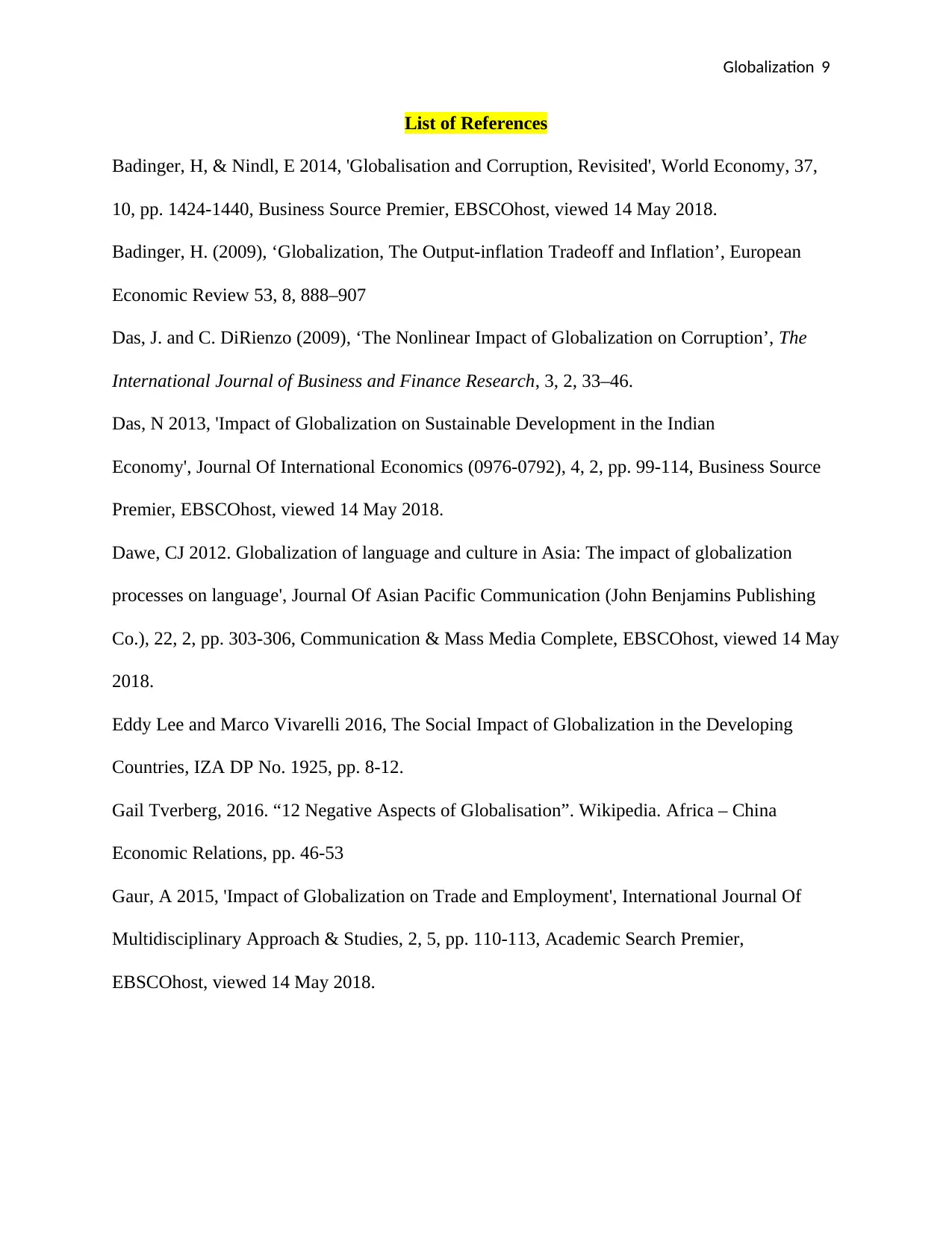
Globalization 9
List of References
Badinger, H, & Nindl, E 2014, 'Globalisation and Corruption, Revisited', World Economy, 37,
10, pp. 1424-1440, Business Source Premier, EBSCOhost, viewed 14 May 2018.
Badinger, H. (2009), ‘Globalization, The Output-inflation Tradeoff and Inflation’, European
Economic Review 53, 8, 888–907
Das, J. and C. DiRienzo (2009), ‘The Nonlinear Impact of Globalization on Corruption’, The
International Journal of Business and Finance Research, 3, 2, 33–46.
Das, N 2013, 'Impact of Globalization on Sustainable Development in the Indian
Economy', Journal Of International Economics (0976-0792), 4, 2, pp. 99-114, Business Source
Premier, EBSCOhost, viewed 14 May 2018.
Dawe, CJ 2012. Globalization of language and culture in Asia: The impact of globalization
processes on language', Journal Of Asian Pacific Communication (John Benjamins Publishing
Co.), 22, 2, pp. 303-306, Communication & Mass Media Complete, EBSCOhost, viewed 14 May
2018.
Eddy Lee and Marco Vivarelli 2016, The Social Impact of Globalization in the Developing
Countries, IZA DP No. 1925, pp. 8-12.
Gail Tverberg, 2016. “12 Negative Aspects of Globalisation”. Wikipedia. Africa – China
Economic Relations, pp. 46-53
Gaur, A 2015, 'Impact of Globalization on Trade and Employment', International Journal Of
Multidisciplinary Approach & Studies, 2, 5, pp. 110-113, Academic Search Premier,
EBSCOhost, viewed 14 May 2018.
List of References
Badinger, H, & Nindl, E 2014, 'Globalisation and Corruption, Revisited', World Economy, 37,
10, pp. 1424-1440, Business Source Premier, EBSCOhost, viewed 14 May 2018.
Badinger, H. (2009), ‘Globalization, The Output-inflation Tradeoff and Inflation’, European
Economic Review 53, 8, 888–907
Das, J. and C. DiRienzo (2009), ‘The Nonlinear Impact of Globalization on Corruption’, The
International Journal of Business and Finance Research, 3, 2, 33–46.
Das, N 2013, 'Impact of Globalization on Sustainable Development in the Indian
Economy', Journal Of International Economics (0976-0792), 4, 2, pp. 99-114, Business Source
Premier, EBSCOhost, viewed 14 May 2018.
Dawe, CJ 2012. Globalization of language and culture in Asia: The impact of globalization
processes on language', Journal Of Asian Pacific Communication (John Benjamins Publishing
Co.), 22, 2, pp. 303-306, Communication & Mass Media Complete, EBSCOhost, viewed 14 May
2018.
Eddy Lee and Marco Vivarelli 2016, The Social Impact of Globalization in the Developing
Countries, IZA DP No. 1925, pp. 8-12.
Gail Tverberg, 2016. “12 Negative Aspects of Globalisation”. Wikipedia. Africa – China
Economic Relations, pp. 46-53
Gaur, A 2015, 'Impact of Globalization on Trade and Employment', International Journal Of
Multidisciplinary Approach & Studies, 2, 5, pp. 110-113, Academic Search Premier,
EBSCOhost, viewed 14 May 2018.
⊘ This is a preview!⊘
Do you want full access?
Subscribe today to unlock all pages.

Trusted by 1+ million students worldwide
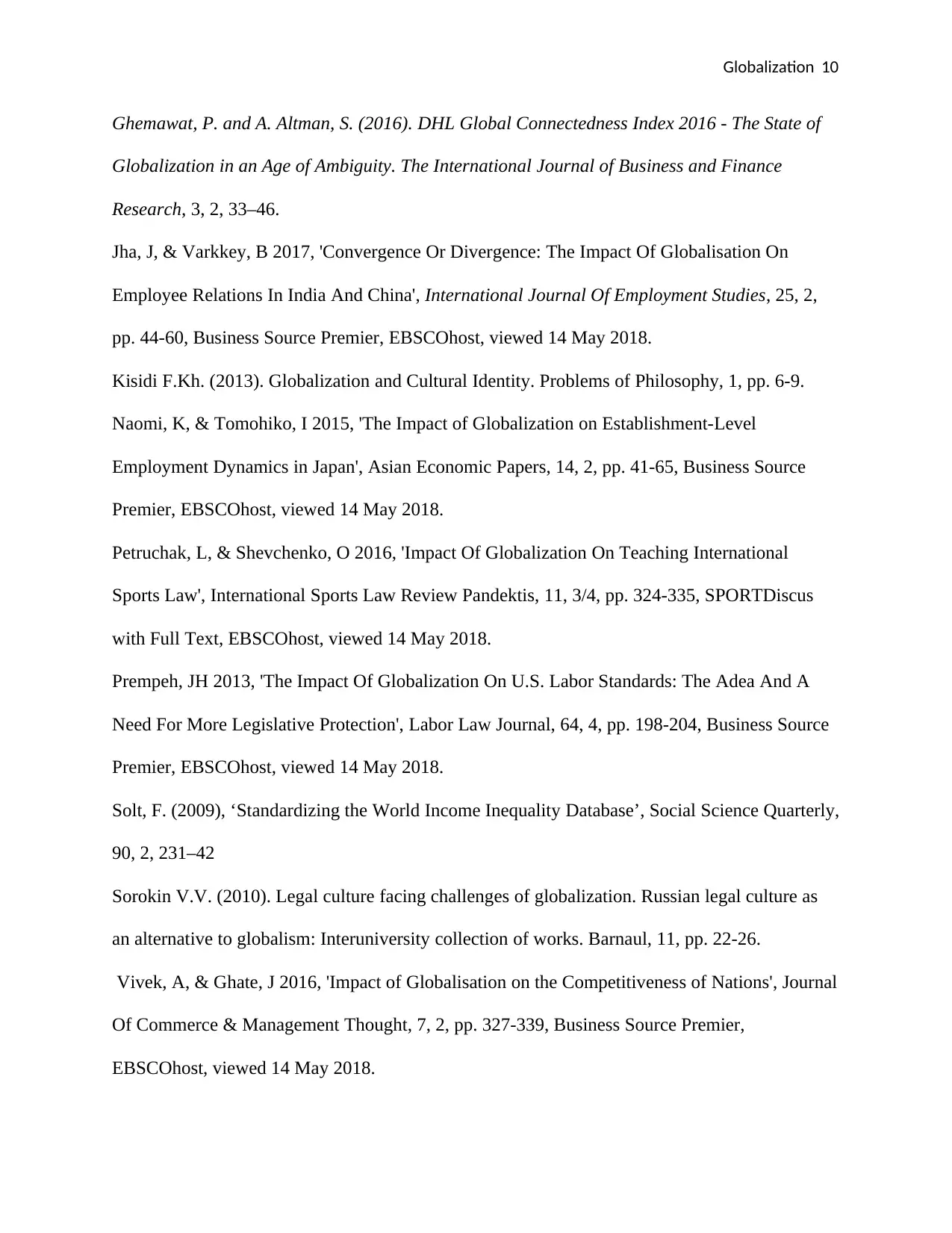
Globalization 10
Ghemawat, P. and A. Altman, S. (2016). DHL Global Connectedness Index 2016 - The State of
Globalization in an Age of Ambiguity. The International Journal of Business and Finance
Research, 3, 2, 33–46.
Jha, J, & Varkkey, B 2017, 'Convergence Or Divergence: The Impact Of Globalisation On
Employee Relations In India And China', International Journal Of Employment Studies, 25, 2,
pp. 44-60, Business Source Premier, EBSCOhost, viewed 14 May 2018.
Kisidi F.Kh. (2013). Globalization and Cultural Identity. Problems of Philosophy, 1, pp. 6-9.
Naomi, K, & Tomohiko, I 2015, 'The Impact of Globalization on Establishment-Level
Employment Dynamics in Japan', Asian Economic Papers, 14, 2, pp. 41-65, Business Source
Premier, EBSCOhost, viewed 14 May 2018.
Petruchak, L, & Shevchenko, O 2016, 'Impact Of Globalization On Teaching International
Sports Law', International Sports Law Review Pandektis, 11, 3/4, pp. 324-335, SPORTDiscus
with Full Text, EBSCOhost, viewed 14 May 2018.
Prempeh, JH 2013, 'The Impact Of Globalization On U.S. Labor Standards: The Adea And A
Need For More Legislative Protection', Labor Law Journal, 64, 4, pp. 198-204, Business Source
Premier, EBSCOhost, viewed 14 May 2018.
Solt, F. (2009), ‘Standardizing the World Income Inequality Database’, Social Science Quarterly,
90, 2, 231–42
Sorokin V.V. (2010). Legal culture facing challenges of globalization. Russian legal culture as
an alternative to globalism: Interuniversity collection of works. Barnaul, 11, pp. 22-26.
Vivek, A, & Ghate, J 2016, 'Impact of Globalisation on the Competitiveness of Nations', Journal
Of Commerce & Management Thought, 7, 2, pp. 327-339, Business Source Premier,
EBSCOhost, viewed 14 May 2018.
Ghemawat, P. and A. Altman, S. (2016). DHL Global Connectedness Index 2016 - The State of
Globalization in an Age of Ambiguity. The International Journal of Business and Finance
Research, 3, 2, 33–46.
Jha, J, & Varkkey, B 2017, 'Convergence Or Divergence: The Impact Of Globalisation On
Employee Relations In India And China', International Journal Of Employment Studies, 25, 2,
pp. 44-60, Business Source Premier, EBSCOhost, viewed 14 May 2018.
Kisidi F.Kh. (2013). Globalization and Cultural Identity. Problems of Philosophy, 1, pp. 6-9.
Naomi, K, & Tomohiko, I 2015, 'The Impact of Globalization on Establishment-Level
Employment Dynamics in Japan', Asian Economic Papers, 14, 2, pp. 41-65, Business Source
Premier, EBSCOhost, viewed 14 May 2018.
Petruchak, L, & Shevchenko, O 2016, 'Impact Of Globalization On Teaching International
Sports Law', International Sports Law Review Pandektis, 11, 3/4, pp. 324-335, SPORTDiscus
with Full Text, EBSCOhost, viewed 14 May 2018.
Prempeh, JH 2013, 'The Impact Of Globalization On U.S. Labor Standards: The Adea And A
Need For More Legislative Protection', Labor Law Journal, 64, 4, pp. 198-204, Business Source
Premier, EBSCOhost, viewed 14 May 2018.
Solt, F. (2009), ‘Standardizing the World Income Inequality Database’, Social Science Quarterly,
90, 2, 231–42
Sorokin V.V. (2010). Legal culture facing challenges of globalization. Russian legal culture as
an alternative to globalism: Interuniversity collection of works. Barnaul, 11, pp. 22-26.
Vivek, A, & Ghate, J 2016, 'Impact of Globalisation on the Competitiveness of Nations', Journal
Of Commerce & Management Thought, 7, 2, pp. 327-339, Business Source Premier,
EBSCOhost, viewed 14 May 2018.
Paraphrase This Document
Need a fresh take? Get an instant paraphrase of this document with our AI Paraphraser
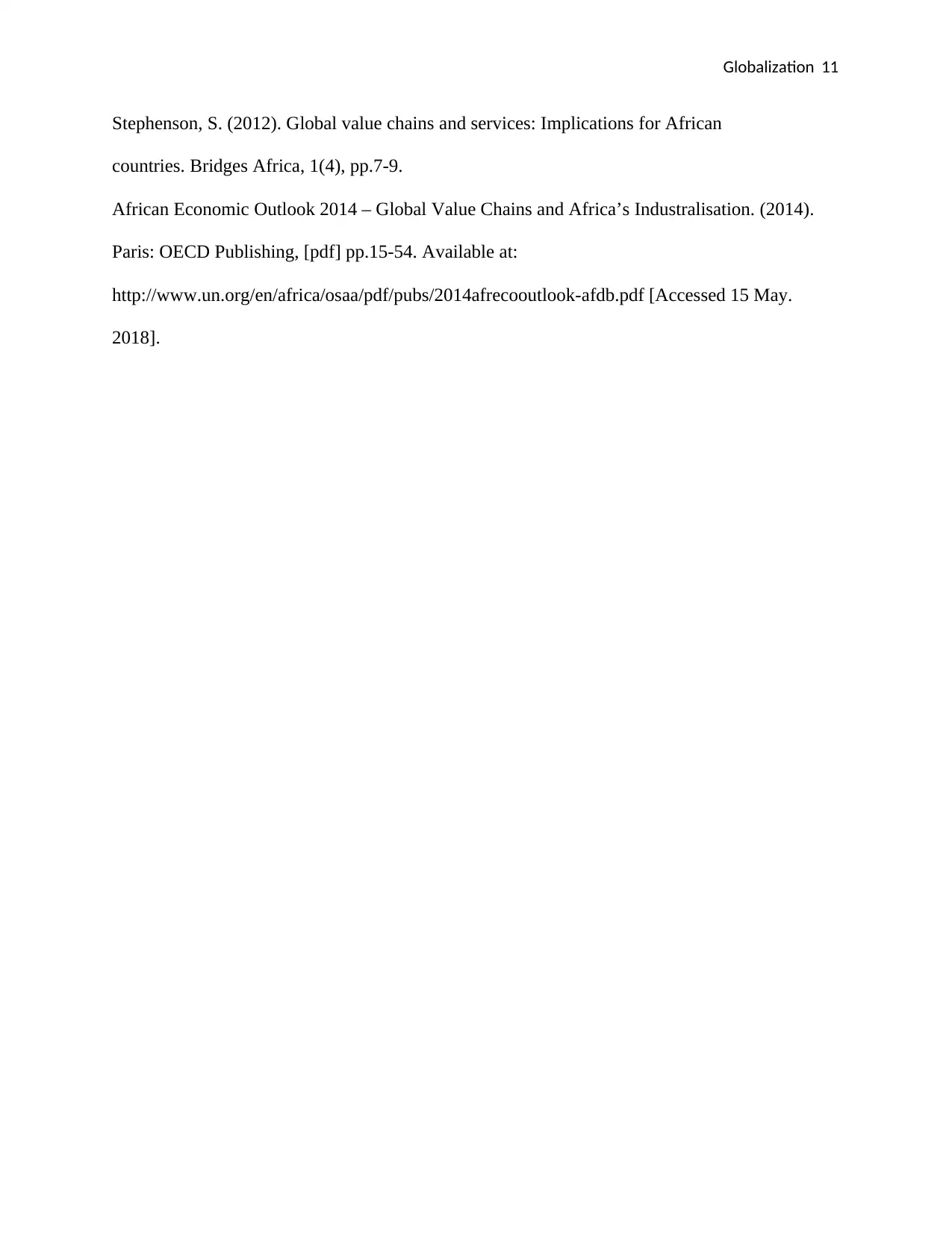
Globalization 11
Stephenson, S. (2012). Global value chains and services: Implications for African
countries. Bridges Africa, 1(4), pp.7-9.
African Economic Outlook 2014 – Global Value Chains and Africa’s Industralisation. (2014).
Paris: OECD Publishing, [pdf] pp.15-54. Available at:
http://www.un.org/en/africa/osaa/pdf/pubs/2014afrecooutlook-afdb.pdf [Accessed 15 May.
2018].
Stephenson, S. (2012). Global value chains and services: Implications for African
countries. Bridges Africa, 1(4), pp.7-9.
African Economic Outlook 2014 – Global Value Chains and Africa’s Industralisation. (2014).
Paris: OECD Publishing, [pdf] pp.15-54. Available at:
http://www.un.org/en/africa/osaa/pdf/pubs/2014afrecooutlook-afdb.pdf [Accessed 15 May.
2018].
1 out of 11
Related Documents
Your All-in-One AI-Powered Toolkit for Academic Success.
+13062052269
info@desklib.com
Available 24*7 on WhatsApp / Email
![[object Object]](/_next/static/media/star-bottom.7253800d.svg)
Unlock your academic potential
Copyright © 2020–2026 A2Z Services. All Rights Reserved. Developed and managed by ZUCOL.



